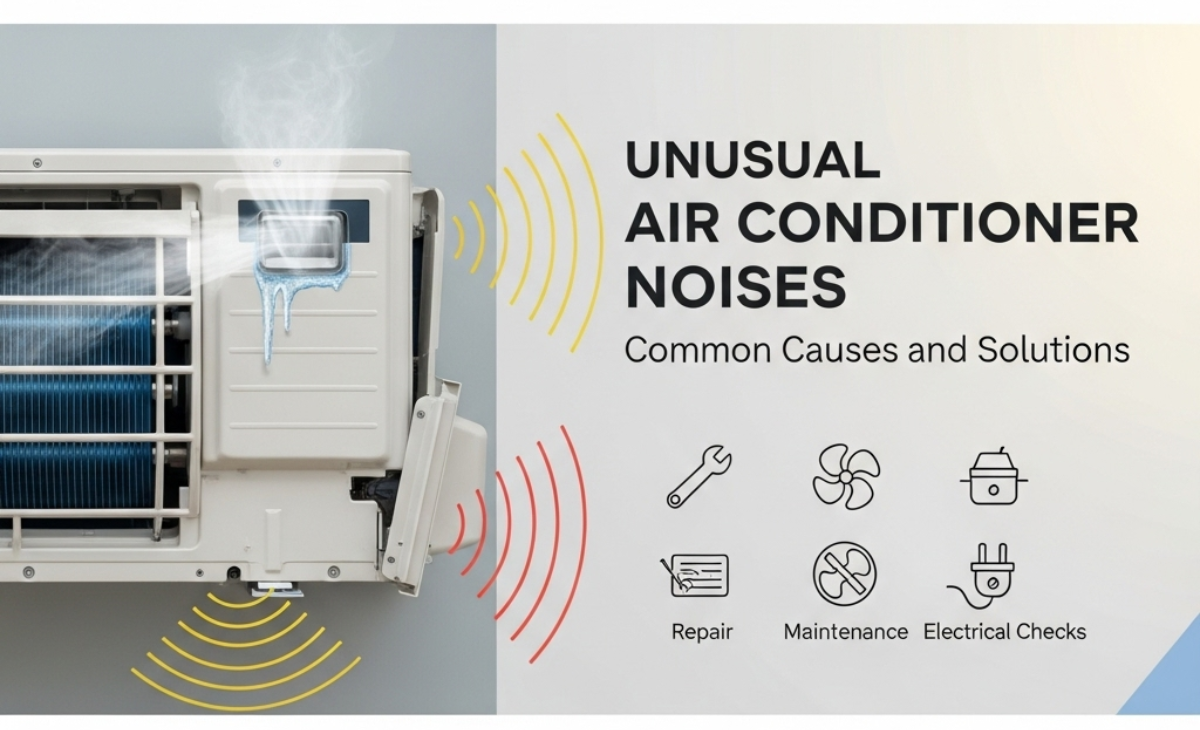When homeowners encounter an Unusual Air Conditioner Noise, it often signals that the system is trying to communicate a problem. From rattling and buzzing to hissing and dripping, these sounds rarely mean something good. This blog explains the most common types of noises, their likely causes, and what quick solutions are possible. It also includes useful insights into “AC comes on, sounds like bass in a car below my house” and answers pressing questions like “How Loud Is ‘Normal’ For A Through The Wall AC?” By understanding these cues early, homeowners can make smart decisions—and know when it’s time to call professionals.
What does it mean when an air conditioner makes screeching or rattling sounds?
Unusual Air Conditioner Noise often begins as a screech or rattle. A high-pitched screech typically points to worn fan motor bearings, a damaged blower wheel, or belt issues—commonly causing what people describe as a metallic grind. Rattling or banging noises may occur when screws, panels, or debris inside the outdoor unit come loose and vibrate against each other.
In these situations, a homeowner can shut off the unit and visually inspect for loose parts or foreign debris. Tightening panels or removing leaves and twigs may offer a quick fix. However, persistent or mechanical-sounding screeching usually requires professional inspection to prevent further damage.
As the fan motor struggles, air conditioner sound may start to impact overall performance—resulting in uneven airflow or reduced cooling. Recognizing these early cues can preserve efficiency and prolong equipment life. To make the right decision when professional help is needed, homeowners can review How to Choose the Right Air Conditioning Service: Key Factors to Consider before hiring a technician.
Types of Air Conditioner Noises and How to Fix Them
Understanding the different types of sounds your system makes helps distinguish between harmless operation and a warning sign. Below are eight unusual noises that deserve attention.
1. Banging or Clanking Sounds
A loud banging or clanking noise often points to loose or broken components inside the unit. Common culprits include a loose fan blade, detached compressor parts, or debris rattling in the system. When left unresolved, the imbalance can strain the motor and cause further internal damage.
The quick solution is to shut down the system and check for visible obstructions. If nothing is found, professional inspection is necessary since compressor or blower issues usually require advanced tools and expertise.
2. Screeching or Squealing Noises
A screeching or squealing sound is often a cry for help from the blower motor or fan belt. Over time, bearings in the motor dry out, creating high-pitched friction sounds. If your unit is older, worn belts may also be the issue.
Ignoring this sound risks overheating the motor or complete fan failure. Lubricating motor bearings or replacing the belt can sometimes resolve the noise, but more serious mechanical issues should be handled by a qualified HVAC technician.
3. Buzzing or Humming Noises
If your AC produces a buzzing or humming noise, electrical issues are the most likely cause. Loose wiring, faulty capacitors, or malfunctioning contactors create irregular current flow, producing vibration and sound. Sometimes, the noise comes from fan blades hitting obstructions or refrigerant lines vibrating.
Because electrical faults can escalate to safety hazards, it’s critical to switch off the system and schedule professional service. Technicians can test the electrical components and restore safe, efficient operation.
4. Hissing or Whistling Sounds
Hissing or whistling from an air conditioner often signals refrigerant leaks or air escaping under high pressure. If refrigerant is leaking, not only will cooling performance drop, but the system may freeze up and suffer long-term damage. In extreme cases, whistling may come from dangerously high compressor pressure.
Since refrigerant handling requires EPA-certified expertise, homeowners should not attempt DIY repairs. Turning off the system and calling local air conditioning services is the safest option to prevent further harm. For additional guidance, the Top 7 Warning Signs Your Air Conditioner Requires Immediate Repair resource provides a clear checklist of situations when professional intervention is critical.
5. Persistent Clicking Noises
While a soft clicking sound at startup or shutdown is normal, constant clicking throughout operation is not. This often indicates faulty relays, a failing control board, or thermostat wiring issues. Clicking can also mean that electrical signals are failing to communicate with the system correctly.
If ignored, the AC may eventually fail to power on at all. Because this issue involves electrical parts, it’s best to consult professionals who can safely test the circuitry.
6. Bubbling or Gurgling Sounds
Hearing a bubbling or gurgling sound usually points to liquid or air trapped in the refrigerant line or condensate drain. A clogged drain pipe can cause water to back up and produce gurgling noises, while refrigerant leaks create bubbling effects as gas and liquid mix.
Clearing condensate drains is sometimes a safe DIY fix, but refrigerant line repairs require professional service. Continuing to run the unit with leaks can reduce efficiency and damage the compressor.
7. Grinding or Metallic Sounds
Few noises are as alarming as a grinding or metallic sound. This usually means the blower motor bearings are failing or metal parts inside the unit are scraping against each other. If untreated, the grinding will only worsen, leading to total motor breakdown.
Lubrication may help in the very early stages, but grinding often indicates a part replacement is necessary. Because motors are vital to airflow and cooling, this issue requires immediate professional repair to avoid complete system failure.
8. Thumping or Popping Sounds
A thumping or popping sound may seem minor, but it often points to ductwork expansion and contraction. As cold air flows through hot ducts, metal can expand and pop loudly. Sometimes, poor duct insulation or loose joints amplify the effect.
If the sound is frequent or especially loud, it may signal structural issues in the duct system. Sealing joints and adding insulation usually reduce noise, but an HVAC technician can confirm whether duct repairs are necessary.
Other Notable Sounds and Underlying Issues
Even beyond the most common noises, there are other acoustic clues worth noting:
- Thumping or Popping: Often a sign of thermal expansion or contraction in the ductwork, especially during temperature changes. While some shifting is normal, excessive noise may mean loose ducts or poor insulation.
- Grinding: Typically indicates worn bearings or misaligned parts in the blower motor. Left unchecked, it may lead to motor failure.
- Soft Hum or Gentle Click: An innocent baseline noise when the AC comes on or off; these are expected, but changes in volume or tone warrant attention.
Why Addressing Unusual Air Conditioner Noise Early Matters
Every odd sound can be a symptom. Here’s why homeowners shouldn’t delay:
- Prevents Escalating Damage – A loose screw may seem minor, but if ignored, it could dislodge internally or damage the compressor.
- Boosts Efficiency – Issues like refrigerant leaks or electrical faults make the AC work harder, driving up energy bills.
- Ensures Safety – Some noises (like buzzing or hissing) may signal electrical hazards or refrigerant leaks that pose health risks.
- Extends System Lifespan – Timely intervention keeps the system in better shape and delays premature replacement.
These noise issues often overlap with other malfunctions—such as leaks, weak airflow, or frozen coils. For a broader look at overlapping concerns, check out Most Common Air Conditioning Problems and How to Fix Them Easily, which complements the noise-based troubleshooting covered here.
Addressing the Question: How Loud Is “Normal” For A Through-The-Wall AC?
Through-the-wall AC units are inherently louder due to compact design and proximity to walls. A low, steady hum and occasional light clicking at startup are generally acceptable. However, persistent rumbling, droning, or vibration booming through walls falls outside “normal.” If the unit sounds like a base from below, inspecting for imbalanced components or vibration mounts is wise.
When to Call for Local Help
If quick checks don’t fix the issue—or if the noise suggests electrical or refrigerant problems—it’s time to reach out to professionals offering air conditioning services Las Vegas NV. As a trusted air conditioning services company and among the best air conditioning services locally, timely service can prevent major dysfunction.
Homeowners should evaluate factors to choose the right air conditioning service, such as licensing, tie-ins with refrigerant safety protocols, response times, and customer reviews. A reputable provider will offer a thorough diagnosis and effective repairs.
If the noise persists, signaling deeper issues, you may also find value in reviewing 7 warning signs air conditioning need repair, which covers slipping performance, strange odors, and erratic operation.
Meanwhile, for general questions about components or emergency assistance, homeowners can always Contact us directly.
FAQs
-
Why is my AC suddenly making a loud banging noise?
A banging sound often means something inside has loosened—possibly fan blades, screws, or even compressor parts. These require inspection and immediate attention.
-
Can a dirty air filter cause an AC to make noise?
Yes. A clogged filter restricts airflow, forcing the blower to work harder, resulting in whining, whistling, or even buzzing noises.
-
Is it safe to run the AC if I hear a hissing sound?
No—hissing usually signals a refrigerant leak or excessive pressure. It’s safer to turn off the system and contact an HVAC technician immediately.
-
My AC clicks occasionally—is that normal?
A soft click at start or shutdown is typical. But repetitive or constant clicking is likely electrical and may involve a failing relay or control board.
-
How often does an AC unit need maintenance to avoid noise issues?
Annual or biannual maintenance is recommended—regular cleaning, lubrication, and inspections can catch issues before they manifest as strange noises.
Conclusion
Addressing Unusual Air Conditioner Noise promptly helps avoid larger, costlier issues. Whether the sound is a rattling panel, buzzing fan, or ominous hissing, recognizing the type of noise and knowing the quick steps can make all the difference. Remember: simple fixes like tightening a screw or clearing debris may suffice—but many symptoms require professional care.
If there’s a nagging sound or lingering concern, reach out today through our Contact us page. Absolute Air Conditioning Heating is recognized as the best HVAC Service Company, delivering expert diagnosis, trusted solutions, and dependable comfort.





